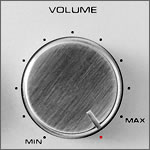I found this article the other day:
Why Loud Music in Bars Increases Alcohol Consumption

When the music goes up, the beers go down.
Lowering the lights signals the real beginning of night-time fun: with dimmed lights and alcohol beginning to work its magic the business of loosening up after the day's exertions can truly begin.
But turning the music up so loud that people are forced to shout at each other doesn't have quite the same beneficial effect on social interactions. Because everyone is shouting, the bar becomes even noisier and soon people start to give up trying to communicate and focus on their drinking, meaning more trips to the bar, and more regrets in the morning.
Of course this is exactly what bar owners are hoping for. People sitting around quietly nursing their drinks for hours are no good for profits. Talkers aren't the best drinkers. At least that is the received wisdom in the industry. And this received wisdom turns out to be accurate according to field studies conducted in French bars by Professor Nicolas Guegen and colleagues.
Drink up
One study by Gueguen et al. (2004) (PDF) found that higher sound levels lead to people drinking more. In a new study published in Alcoholism: Clinical & Experimental Research, Gueguen et al. (2008) visited a bar in the west of France to confirm their previous finding in a naturalistic setting. Here, they observed customers' drinking habits across three Saturday nights, in two different bars in the city.
The level of the music was randomly manipulated to create the conditions of a true experiment. It was either at its usual volume of 72dB or turned up to 88dB. For comparison: 72db is like the sound of traffic on a busy street while 88db is like standing next to a lawnmower.
Sure enough when the music went up the beers went down, faster. On average bar-goers took 14.5 minutes to finish a 250ml (8 oz) glass of draught beer when the music was at its normal level. But this came down to just 11.5 minutes when the music was turned up. As a result, on average, during their time in the bar each participant ordered one more drink in the loud music condition than in the normal music condition.
The observers even measured the number of gulps taken to finish each drink - the level of the music was found to have no effect on this. So the faster drinking was as a result of more gulps rather than bigger gulps.
Drinking instead of talking?
Since the volume of the music was randomly manipulated this experiment suggests that louder music causes more drinking, but what it doesn't tell us is why. Some think that people drink instead of talking while others have argued that they drink more because the music creates greater levels of arousal, which then leads to more drinking.Evidence from a study carried out in pubs in Glasgow, Scotland by Forsyth and Cloonan (2008) does back up the idea that people do, at least partly, drink because they can't talk to each other. Perhaps further studies comparing lone drinkers with dyads and bigger groups would confirm or disprove this idea.
Whatever the real reason, or combination of reasons, this kind of study is very persuasive about the causal connection between louder music and more drinking because the experimenters have taken the time to go to a bar, set up the random experimental manipulation and then actually observe people to see what they do in a real live environment.
On top of that, from the point of the view of the participant, I think it would definitely enhance your night-out to find out that you'd been inadvertently furthering psychological science by sinking a few cold ones. Or is that just the researcher (or beer-drinker) in me coming out?
» This is part of a series on the psychology of the everyday.
[Image credits: john and Thomas Hawk] Sphere: Related Content













No comments:
Post a Comment